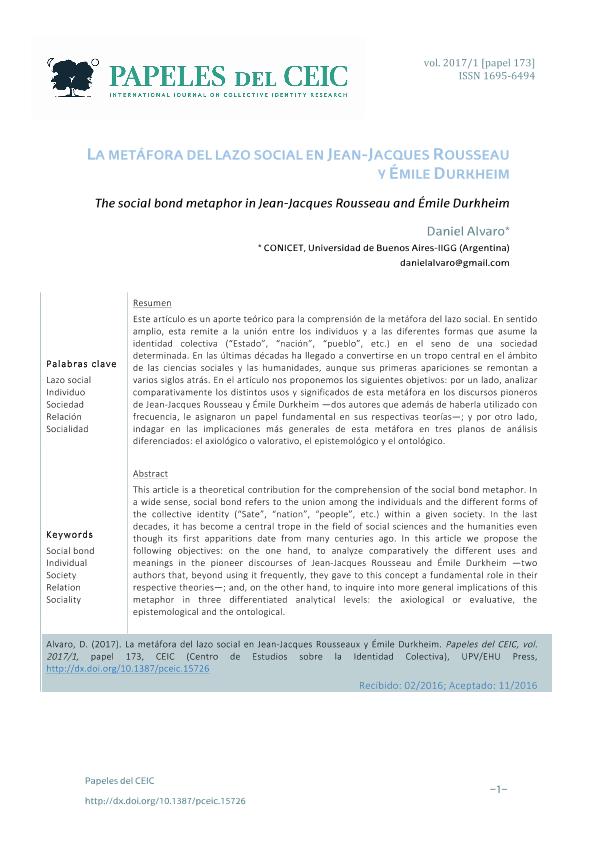Mostrar el registro sencillo del ítem
dc.contributor.author
Alvaro Candia, Daniel Fernando

dc.date.available
2020-06-04T16:04:23Z
dc.date.issued
2016-06
dc.identifier.citation
Alvaro Candia, Daniel Fernando; La metáfora del lazo social en Jean-Jacques Rousseau y Émile Durkheim; Universidad del País Vasco; Papeles del CEIC; 6-2016; 1-26
dc.identifier.issn
1695-6494
dc.identifier.uri
http://hdl.handle.net/11336/106683
dc.description.abstract
Este artículo es un aporte teórico para la comprensión de la metáfora del lazo social. En sentido amplio, esta remite a la unión entre los individuos y a las diferentes formas que asume la identidad colectiva (“Estado”, “nación”, “pueblo”, etc.) en el seno de una sociedad determinada. En las últimas décadas ha llegado a convertirse en un tropo central en el ámbito de las ciencias sociales y las humanidades, aunque sus primeras apariciones se remontan a varios siglos atrás. En el artículo nos proponemos los siguientes objetivos: por un lado, analizar comparativamente los distintos usos y significados de esta metáfora en los discursos pioneros de Jean-Jacques Rousseau y Émile Durkheim —dos autores que además de haberla utilizado con frecuencia, le asignaron un papel fundamental en sus respectivas teorías—; y por otro lado, indagar en las implicaciones más generales de esta metáfora en tres planos de análisis diferenciados: el axiológico o valorativo, el epistemológico y el ontológico.
dc.description.abstract
This article is a theoretical contribution for the comprehension of the social bond metaphor. In a wide sense, social bond refers to the union among the individuals and the different forms of the collective identity (“Sate”, “nation”, “people”, etc.) within a given society. In the last decades, it has become a central trope in the field of social sciences and the humanities even though its first apparitions date from many centuries ago. In this article we propose the following objectives: on the one hand, to analyze comparatively the different uses and meanings in the pioneer discourses of Jean-Jacques Rousseau and Émile Durkheim —two authors that, beyond using it frequently, they gave to this concept a fundamental role in their respective theories—; and, on the other hand, to inquire into more general implications of this metaphor in three differentiated analytical levels: the axiological or evaluative, the epistemological and the ontological.
dc.format
application/pdf
dc.language.iso
spa
dc.publisher
Universidad del País Vasco

dc.rights
info:eu-repo/semantics/openAccess
dc.rights.uri
https://creativecommons.org/licenses/by-nc-sa/2.5/ar/
dc.subject
INDIVIDUO
dc.subject
SOCIEDAD
dc.subject
RELACIÓN
dc.subject
SOCIALIDAD
dc.subject.classification
Otras Sociología

dc.subject.classification
Sociología

dc.subject.classification
CIENCIAS SOCIALES

dc.title
La metáfora del lazo social en Jean-Jacques Rousseau y Émile Durkheim
dc.type
info:eu-repo/semantics/article
dc.type
info:ar-repo/semantics/artículo
dc.type
info:eu-repo/semantics/publishedVersion
dc.date.updated
2020-06-02T20:40:23Z
dc.journal.pagination
1-26
dc.journal.pais
España

dc.description.fil
Fil: Alvaro Candia, Daniel Fernando. Universidad de Buenos Aires. Facultad de Ciencias Sociales. Instituto de Investigaciones "Gino Germani"; Argentina. Consejo Nacional de Investigaciones Científicas y Técnicas; Argentina
dc.journal.title
Papeles del CEIC
dc.relation.alternativeid
info:eu-repo/semantics/altIdentifier/url/https://www.ehu.eus/ojs/index.php/papelesCEIC/article/view/15726
Archivos asociados
